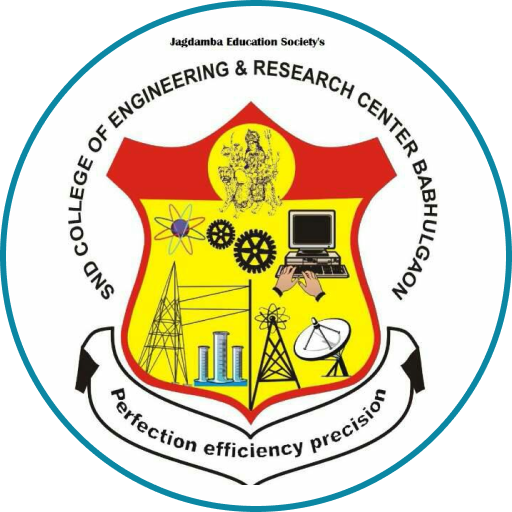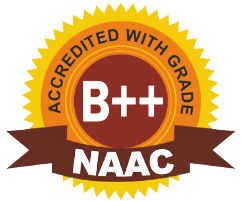Mechanical Department
Mechanical Student Association
CAD/CAM Lab
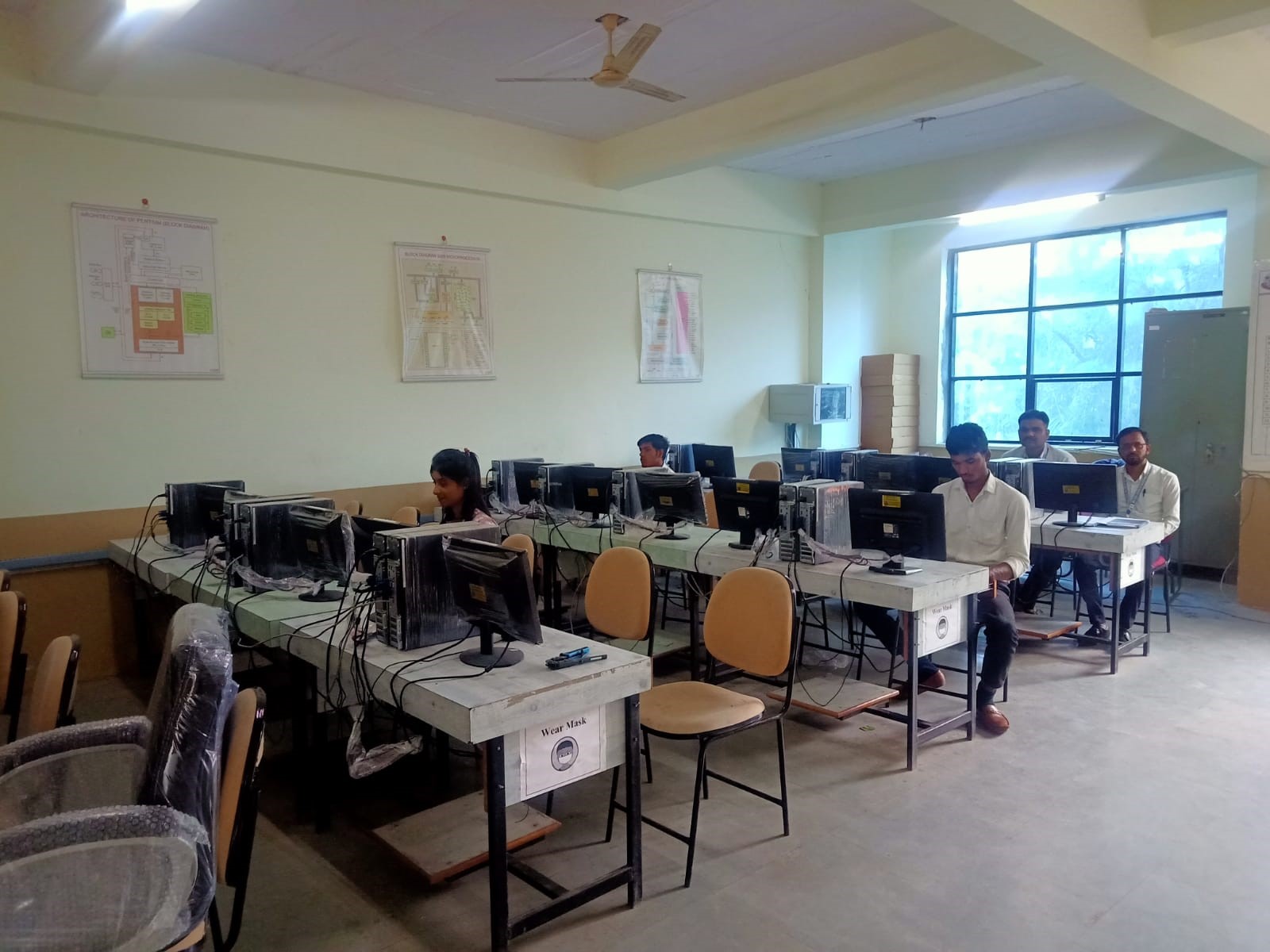
Description:
Nowadays as the technology improving more and more we no longer require the use of protractors and compasses to create drawings, instead there are several classes that focus on the use of various software. This laboratory mainly deals with the detailed engineering of 3D models and/or 2D drawings of physical components using CAD/CAM software Packages, but it is also used throughout the engineering process from conceptual design and layout of products, through strength and dynamic analysis of assemblies to definition of Design and Manufacturing methods of components. It can also be used to design objects and simulation of manufacturing objects. Computer Aided Design (CAD) and Computer Aided Manufacturing is the use of computer systems to assist in the creation, modification, analysis, or optimization of a design and manufacturing simulation. CAD software is used to increase the productivity of the designer, improve the quality of design, improve communications through documentation, and to create a database for manufacturing. Computer Aided Manufacturing (CAM) is the use of computer software to control machine tools and related machinery in the manufacturing of work pieces. This lab deals with drafting and designing purpose. The list of hardware/software is tabulated below.
|
Sr. No. |
Name of the Equipment |
|
01 |
Intel Core I7 6th Generation Server Class System |
|
02 |
Plotter |
|
03 |
Projector |
|
04 |
Invertor With 3 Hours Backup Capacity |
|
Sr. No. |
Software Support |
|
01 |
Ansys |
|
02 |
Matlab |
|
03 |
PTC-Pro E |
|
04 |
Master Cam |
FLUID MECHANICS ENGINEERING

Fluids are a key element of study for many engineering disciplines. Fluid Mechanics is of vital importance in energy conversion systems (hydro power, gas turbines, combustion etc.), in process industry (paper, metals, polymers etc.) and for transports (airplanes, ships etc.). The Fluid Mechanics laboratory is actively engaged to reinforce and enhance understanding of the fundamentals of Fluid Mechanics. The experiments here are designed to demonstrate the applications of the basic fluid engineering principles and to provide a more intuitive and physical Understanding of the theory.
The all experimental set-ups are designed and developed by the institute according to the Indian standards. The Fluid Mechanics lab is equipped with different flow measuring set-ups such as venturi meter, orifice meter, nozzle, centrifugal head meter, where students can visualize the basic theory of working of the flow meter.
|
Sr.No. |
Apparatus/Equipment Details |
|
1 |
Bernoulli’s Theorem Apparatus |
|
2 |
Orifice plate & Venturimeter |
|
3 |
Reynold’s Apparatus |
|
4 |
Metacentric Height Apparatus |
|
5 |
Haleshaw Apparatus |
|
6 |
Pressure Measuring Devices |
|
7 |
Redwood Viscometer |
|
8 |
Saybolt Viscometer |
|
9 |
Electrical Anology Apparatus |
|
10 |
Losses in Pipes Model |
|
11 |
Metacentric Height Apparatus |
|
12 |
Haleshaw Apparatus |
|
13 |
Redwood Viscometer |
PG RESEARCH LAB

The research involved in-depth interviews and focus groups of postgraduate research students in a Group that can be facilities provided through PG Research Lab.. The findings revealed that students had problems with: selection of supervisors, work opportunities within the faculty, knowing what is expected of them and lack of sense of belonging as means of connecting with a broader community of peers and academics. As faculties become aware of international research student challenges, even prior to enrolment, they can provide targeted support in order to contribute to and optimize the educational experience.
SOM LAB
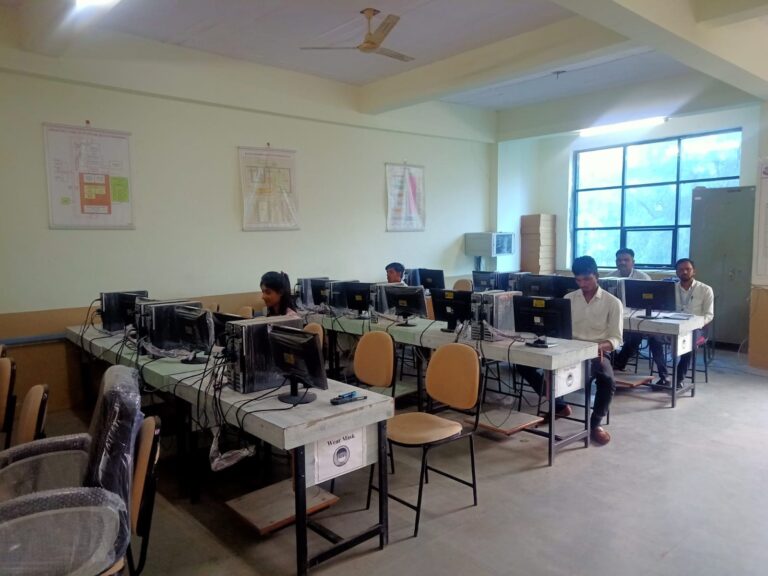
Strength of material course is offered to degree and diploma students and is an important part of the course curriculum. The SOM laboratory contains machines for testing of material like mild steel, copper, aluminium, cubes, and bricks etc. The students are able to synergies the theory with the practical.
|
Sr. No. |
Name of the Equipment |
|
01 |
Universal Testing Machine |
|
02 |
Impact Testing Machine |
|
Sr. No. |
Software Support |
|
01 |
Win UTM |
Theory Of Machine Lab

Theory of Machines is defined as that branch of Engineering-science, which deals with the study of relative motion between the various parts/ elements of a machine, and forces which act on them. The knowledge of this subject is very essential for an engineer in designing the various parts of a machine. The objective of lab is to impart practical knowledge on design and analysis of mechanisms for the specified type of motion in a machine. Through this course, students will able to understand machine kinematics, transmission element, governors, gyroscopes, Epi-cyclic Gear train and Gear Boxes.
Utilization:
Theory of Machine lab is utilizing for conducting practical of Theory of Machine subject. Apart from that many Post Graduate students using Theory of Machine lab for Analyzing Different Mechanisms and Effect and Study of Motion with different Experimental setup.
DOM Lab

Dynamics of Machinery Lab. The objective of this lab is to impart practical knowledge on design and analysis of mechanisms in the machine tools. In Dynamics of machines Laboratory, the students are doing the experiments related to their theory subjects like Engineering Mechanics, Machines and Mechanisms and Fundamentals of Vibration and Noise. Various equipment like governors, gyroscopes, balancing machines and universal vibration testing facilities are available to understand machine dynamics.
|
Sr.No. |
Apparatus/Equipment Details |
|
1 |
Motorized Gyroscope Apparatus |
|
2 |
Universal Vibration Test Rig |
|
3 |
Static & Dynamic Balancing Apparatus |
|
4 |
Whirling of Shaft Apparatus |
|
5 |
FFT Analyzer |
METX Lab

Mechatronics Lab. The Mechatronics Laboratory under the Department of Mechatronics Engineering is one of the important labs of the department that serves academics as well as research. The lab caters the need to provide multi-domain knowledge and system level integration which is expected to be the key role for a mechatronics engineers. The laboratory holds sophisticated equipment’s which are used for conducting academic courses as well as research for faculty and students.
|
Sr.No. |
Apparatus/Equipment Details |
|
1 |
Setup of Verification of P, P+I,P+D, P+I+D control actions |
|
2 |
Setup to study A to D Converter |
|
3 |
Setup to study D to A Converter |
|
4 |
Setup for Level Measurement using Capacitive Transducer |
|
5 |
Flow Measurement using Test rig |
|
6 |
Setup for calibration of Thermocouple & RTD |
|
7 |
Displacement Measurement using Inductive Transducer |
|
8 |
PID control implementation on DC motor speed control system |
|
9 |
PLC Control system – Ladder Logic implementation on real time system |
|
10 |
Demonstration of bottle filling system using PLC/ Microcontroller/ Relays |
PPE Lab
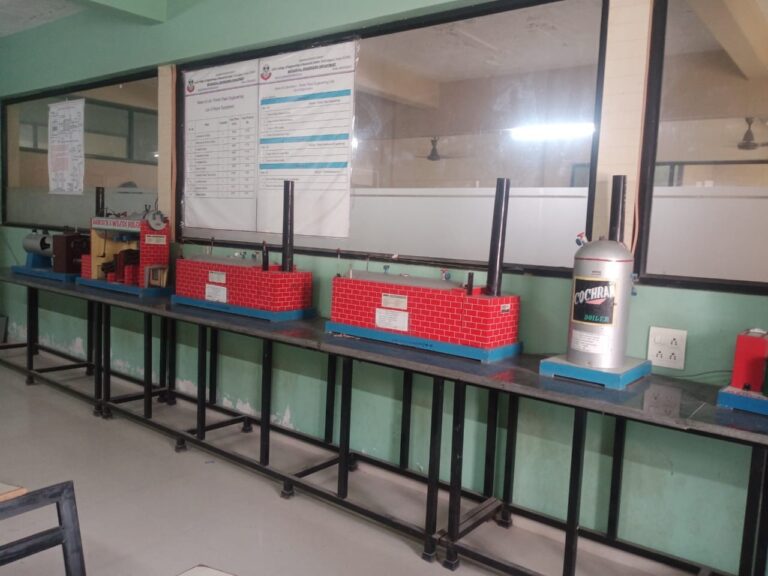
Power Plant Engineering or Power Plant Engineering (English: Power Plant Engineering) abbreviated as TPTL is a branch of the field of Energy engineering , and is defined as the engineering and technology required for the production of an electric power station.[1] Technique is focused on power generation for industry and community, not just for household electricity production. This field is a discipline field using the theoretical basis of mechanical engineering and electrical. The engineering aspects of power generation have developed with technology and are becoming more and more complicated. The introduction of nuclear technology and other existing technology advances have made it possible for power to be created in more ways and on a larger scale than was previously possible. Assignment of different types of engineers for the design, construction, and operation of new power plants depending on the type of system being built, such as whether it is power generation fueled fossil, [[NPP] |nuclear power plant]], hydropower plant, and solar power plant.
|
Sr.No. |
Apparatus/Equipment Details |
|
1 |
Locomotive Boiler |
|
2 |
Babcock & wilcox boiler |
|
3 |
Cornish Boiler |
|
4 |
Lancashier Boiler |
|
5 |
Cochran Boiler |
|
6 |
Marcet Boiler |
|
7 |
Vertical Water Tube Boiler |
|
8 |
Loeffler Boiler |
|
9 |
Lamount Boiler |
|
10 |
Benson Boiler |
|
11 |
Valox Boiler |
|
12 |
Pure Reaction Turbine |
PPE Lab
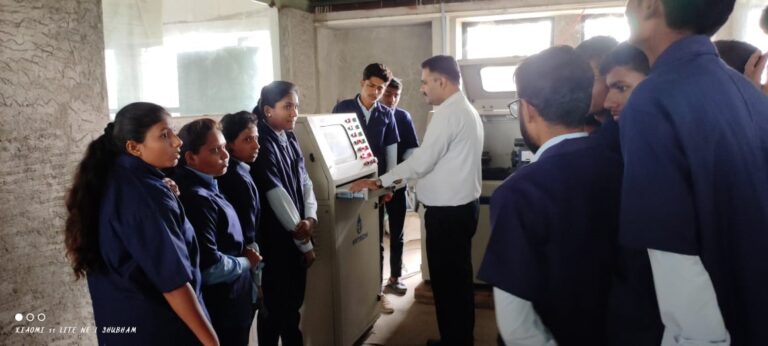
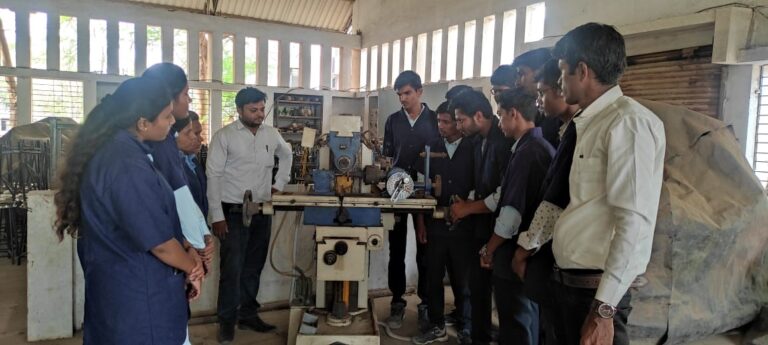
The Workshop basically comprises of all the machines required for production of product of our day to day life. The students are well acquainted with the measuring instruments used and they are given jobs to complete the task. The students are allowed to perform different operations on machine so that their practical knowledge is well enhanced. The Workshop is also utilized for final year students for their project fabrication work. On CNC Trainer lathe machine the students are taught different programs for execution of job and about its accuracy. The list of machines available in Workshop is tabulated below.
|
Sr. No. |
Name of the Equipment |
|
01 |
CNC Trainer Lathe |
|
02 |
Shaper Machine |
|
03 |
Milling Machine |
|
04 |
Surface Grinding Machine |
